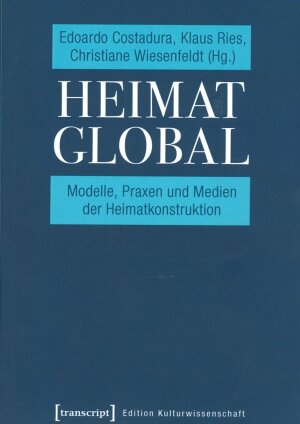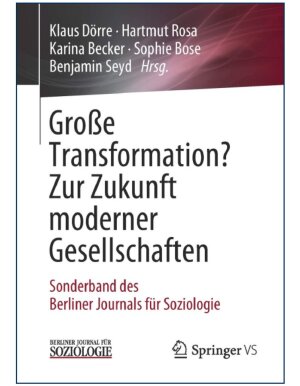THINKING AHEAD
Cover des Bandes »Heimat global. Modelle, Praxen und Medien der Heimatkonstruktion«. ISBN 978-3-8376-4588-0
Image: transcriptDecontaminating the concept of home
In the age of globalization, we have the opportunity to redefine the concept of »homeland« and combat its nationalist appropriation
In 1970, Günter Grass insisted that we must not surrender the concept of »homeland« to the demagogues. The author of »The Tin Drum« showed incredible foresight, as a war has been raging in recent years over the interpretation of the word »homeland«. Klaus Ries, a historian at the University of Jena, describes the term as vague, flexible, and pluralistic—»a concept in a state of flux«. In the age of globalization,
we have the opportunity to redefine the concept of »homeland«, giving new meaning to a oncecontaminated idea. Jena-based novelist Edoardo Costadura adds that the idea of »homeland« is being put to the test by events like the refugee crisis of 2015: »Are refugees able to find a new homeland? What processes take place?« Klaus Ries and Edoarda Costadura worked with Christiane Wiesenfeldt (Institute of Musicology Weimar-Jena) on the book »Heimat global. Modelle, Praxen und Medien der Heimatkonstruktion« (»Global Home. Models, Practices and Media in the Construction of Homeland«), which offers historical accounts and current reflections on the concept of »homeland«.
Sociologist Hartmut Rosa offers one possible interpretation: Home emerges wherever I feel received as a person, where I learn to accept and I am accepted myself. Home cannot be reduced to a mere term, as reflected by the underlying theme of a conference where historians, theologians, political scientists, sociologists, jurists, musicologists, and creative artists exchanged their views at the Friedrich Schiller University. Edoardo Costadura speaks of a laboratory in the sense that home should be understood in the most progressive and enlightening manner as an open and integrative social project. Costadura argues that globalization plays a key role here: »It gives us the opportunity to redefine the concept of ›homeland‹ without restricting ourselves to a nationalist point of view«.
By Stephan Laudien
Krisendebatte: Was bedeutet die Krise für die Zukunft der Demokratie? ISBN 978-3-18-29862-6
Image: suhrkampCrisis debate
Democracy is in crisis. Fundamental upheavals in the economy, environment, and society illustrate that our current growth dynamics are no longer a stabilizing element of society, but another driver of crisis.
This volume has been edited by Hanna Ketterer and Dr Karina Becker, sociologists from the University of Jena. Researchers discuss the impact of the currently perceived crisis on the future of our democracy and the conceivable paths towards democratic transformation. However, one of the featured authors, Prof. Dr. deKlaus Dörre de , does not believe our democracy—or capitalism—is in crisis.
By Ute Schönfelder
Sonderband des Berliner Journals für Soziologie. ISBN 978-3-658-25946-4
Image: Springer VSPost-growth societies
In September 2019, the Berlin Journal of Sociology published a special volume on the occasion of the closing conference of the »Post-Growth Societies« research group at the University of Jena. The volume summarizes the topics and theories of the research group, which received funding since 2011, and addresses some of the major insights gained over the past eight years.
It includes the group’s hypothesis that times of growth are over for countries in the Global North. The volume also addresses the future of the welfare state and democracy, and it looks at the forces and trajectories of social change. The latter is discussed using examples like rightwing populism and the degrowth movement.
By Ute Schönfelder


